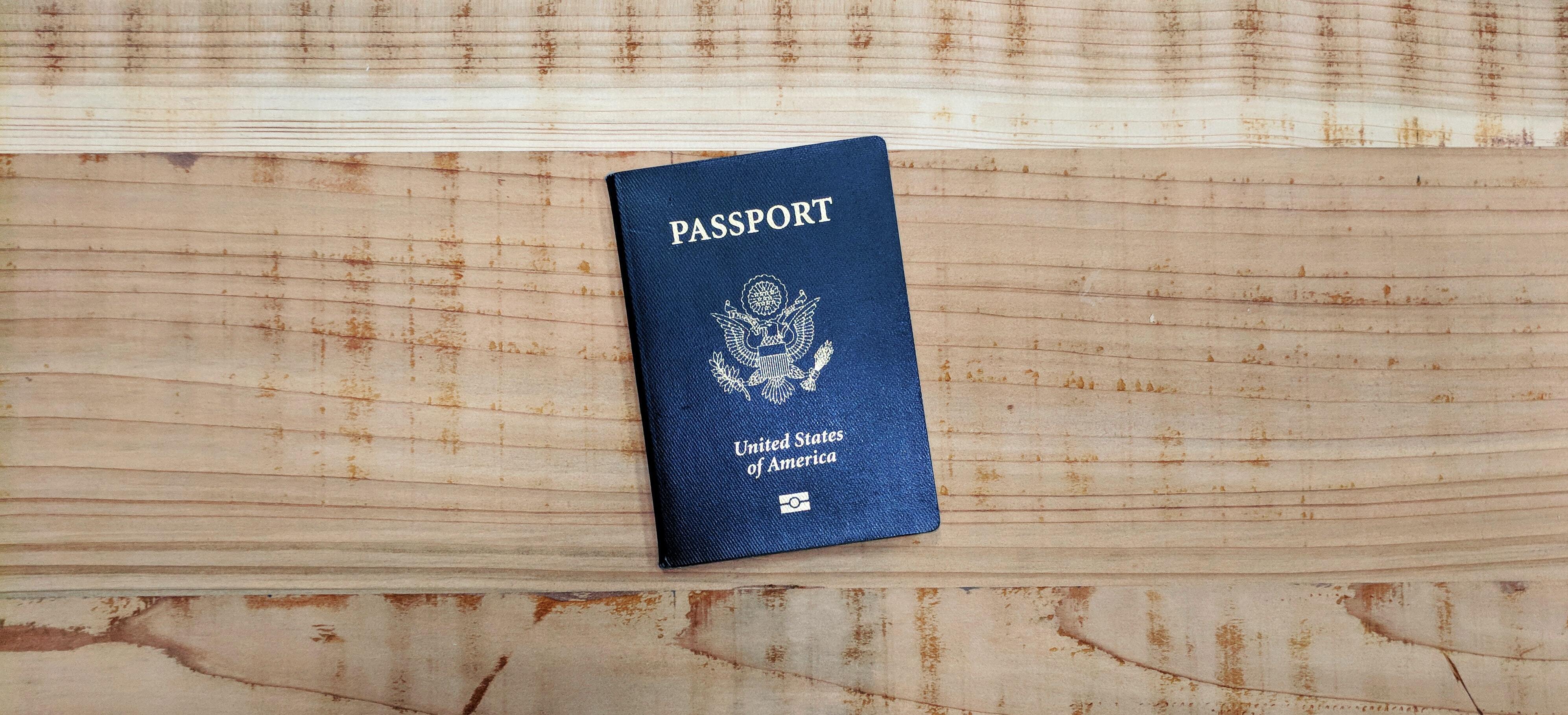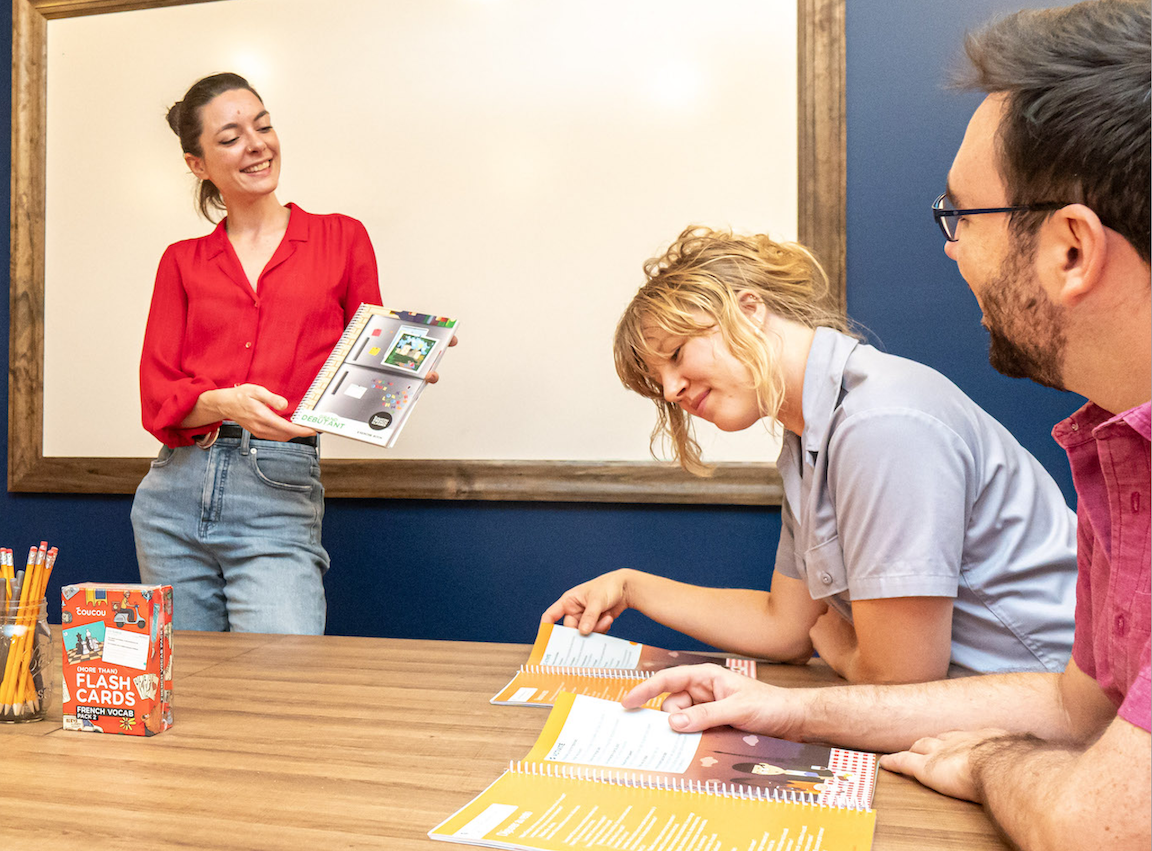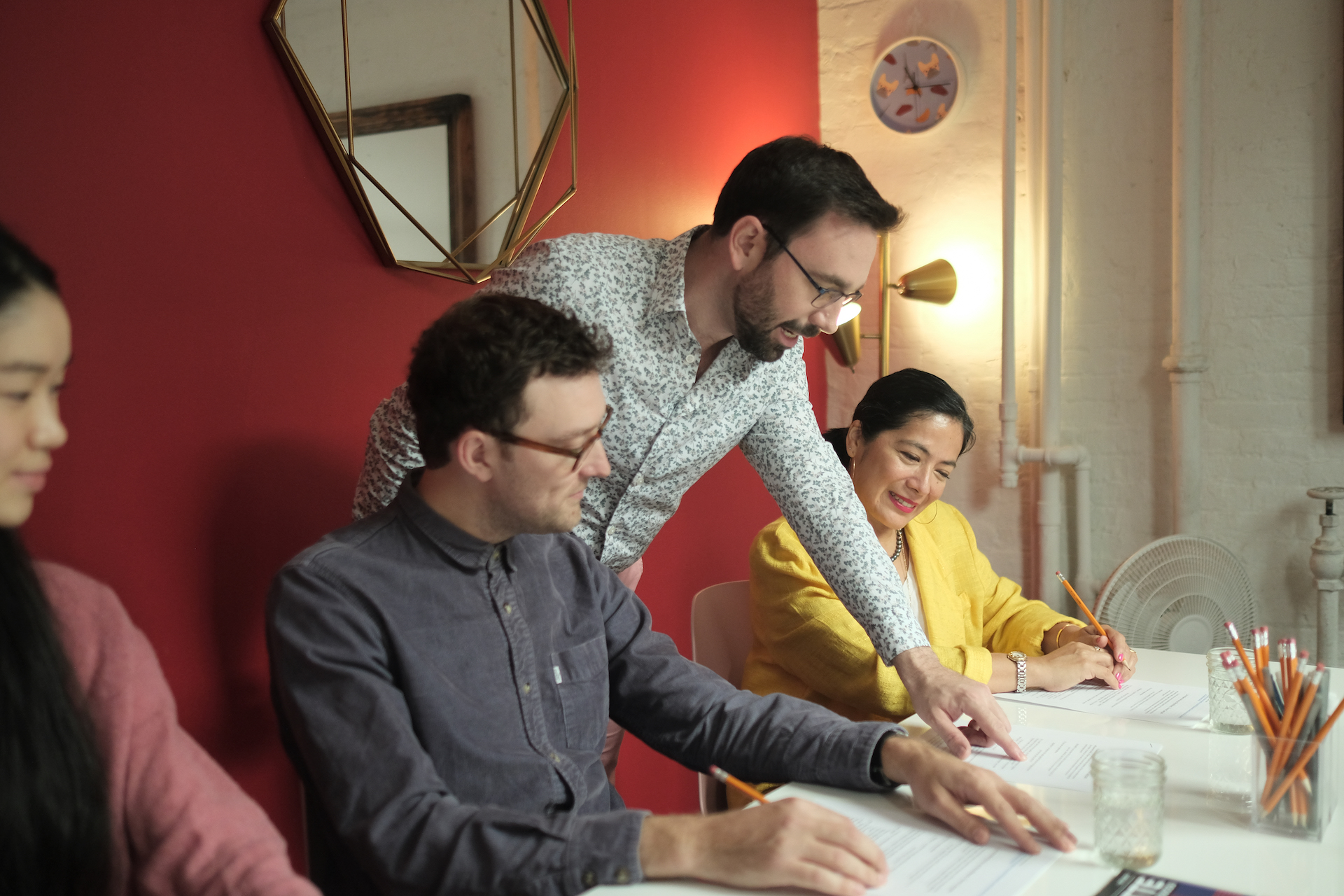Since we opened ten years ago, students have been regularly asking us for tips on how to move to France. That’s why we’ve decided to compile all the information you need to get started in one article! Read on to find out more about housing, job searching, getting a visa, opening a bank account, signing up for healthcare and managing your budget, among other topics. Time to pack your things, let’s go!
By Pierre Beaudet
Paperwork: where to start?

It depends on the type of job you want, but in any case, you’ll need to find one, and your future employer will have to file a preliminary authorization request to be able to apply for a visa.
If you’re between ages 18 and 35, consider applying for the French American Chamber of Commerce’s (FACC) American Outbound program. Citizens who are currently enrolled in college and/or possess a college degree are eligible. The FACC American Outbound program facilitates the visa application process for qualified young Americans aspiring to work in France and companies interested in hosting them for up to 18 months. They expedite candidates’ visas and work authorizations, helping you obtain a work visa for an 18-month CDD* that allows you to train in France. This is a great first step for getting your foot in the door!
If you want to teach, you can also apply to The Teaching Assistant Program in France (TAPIF), which offers you the opportunity to work in France for 7 months, as an English teaching assistant for French students of all ages. TAPIF is a great choice for recent college graduates. If you have a master’s degree and some teaching experience, we recommend applying to be a lecteur or maître de langue at a French university instead (the pay is better!).
* CDDs (Fixed-Term Contracts) are, along with CDIs (Open-Ended Contracts), the two main types of employment contracts, the only difference being that CDDs have an end date, while CDIs do not. Ideally, aim for a CDI, which provides better job security and makes it easier to find an apartment, even though at the beginning of your career you will most likely be offered CDDs.
The visa process

It often takes up to six months to apply for a visa and finally receive it, so you should begin the process early. Of course, whether or not you hire an immigration lawyer depends on your personal circumstances, but we know plenty of Americans who managed to get a visa without one. If you’re working with organizations like the FACC, TAPIF, or if your company is sponsoring you, they will do most of the paperwork for you. If you’re applying for a talent visa or another special category, you may need to hire a lawyer.
Finding an English-speaking job in Paris

If you’re lucky, your company has offices in France and can transfer you. If that’s not the case, this is a difficult question to answer because it depends on the type of employment you’re looking for and the visa you have. If you have a long-stay visa and would like to teach English or work as a nanny, you’ll have no problem finding a job. There are tons of other English-speaking jobs out there, but you’ll have to spend a fair amount of time applying to positions and networking. Many American companies (especially law firms and advertising agencies) have offices in Paris or in other big French cities. You can also look for job offers positions for the US Embassy, the OECD, or the UNESCO.
A few tips to get started:
- The Local: The Local is Europe’s foremost hub for English-language jobs. You can find many English-speaking jobs in Paris, even if some may require you to submit a French CV and cover letter even though you’ll be working in English.
- FUSAC: The “France-USA Contacts” website might look a little old-fashioned, but it’s the perfect place to find jobs at bilingual French-American schools and many other American-only positions.
- We also recommend setting up your Linkedin page in both French and English, thanks to a feature allowing you to display it in multiple languages. It’s the perfect tool to look for work as an expat!
Everything there is to know about French healthcare

If there’s one thing you shouldn’t worry about before moving to France, it’s healthcare. Like most European countries, France has got you covered when it comes to your santé. The “sécu”, as healthcare is called, reimburses the majority of medical costs in the public health system and is accessible to all French residents. The reimbursement varies depending on the service. It’s usually around 70% for visiting a doctor, dentist, or specialist. Reimbursement for visiting a French hospital is around 90%. For prescribed medications, it can be up to 100%.
How to get coverage from French healthcare
- The first step is to get your social security number, by contacting or visiting your local CPAM (Caisse Primaire d’Assurance Maladie). Once you have that number, you can request a carte vitale on the Ameli.fr website. This unmistakable yellow and green card will be your best friend when it comes to paying medical expenses. Doctors will use it to automatically trigger the automatic reimbursement of your health care expenses.
- The rest of your health insurance is covered by a private company, known as a mutuelle. You can find one yourself, but keep in mind that your employer has the obligation to provide one.Expat Maikka Rustia-Piquemal says:
“I wouldn’t worry about this so much because France has universal healthcare. An out-of-pocket appointment to a primary provider here is around 20-25€ (and is reimbursed by social security, Ed.note). My medications that usually cost 150 USD monthly are only 4€ here and can get reimbursed through social security (so I’m basically paying something around 50 cents). However if you have a condition, make sure to check if you have the same type of medication and treatment in France.”
A Parisian’s budget

Good news: rents in Paris are about half as much as in New York! The average cost of an unfurnished apartment (any size) is 1,776€ in central Paris and 1,238€ in arrondissements that are a bit further out.
Also, groceries, public transportation, healthcare and education all cost considerably less in Paris. But wait a second, you’re probably asking, what’s the catch? Well, French salaries are considerably lower than American ones. This doesn’t mean that you can’t live well in Paris (you can!), but you do need to pay attention to your budget.
Some tips :
- Save money by taking a monthly pass for public transportation. There are discounts for students, and if you’re employed, your company has to reimburse at least 50%.
- In the same way, when visiting the rest of France, think of getting an SNCF* card – it pays for itself in just a couple of journeys! And in that case too, there are special offers depending on your profile.
- If you like movies, get a monthly pass too! The most popular movie theater chains, Pathé and UGC, offer an unlimited subscription around 20€ per month (even less if you’re under 26)
- Save $$ by buying monthly metro passes or even a carte jeune if you’re a student (12 to 27 years old) or a carte weekend to travel outside the city for not a lot of money.
- Paris is famous for its museums, but admissioncan be expensive. There are however free museums, such as the ones part of réseaux Paris Musées (also known as City of Paris museums). Others are free on the first Sunday of the month or during special events (night of museums, heritage days…)
- If you enjoy biking, take Vélibs or get a second-hand bike (on le bon coin, at a flea market or during a trocathlon event, organised by a Décathlon store)
- Buy your groceries from markets, they’re usually cheaper. The Barbès market is notoriously the city’s cheapest.
* The National Railway Company is the public company in charge of trains. France has a very dense railway network, which allows you to travel across the country in no time! From Paris, you can reach Normandy in 1 hour, Brittany in 90 minutes, Strasbourg in 1 hour and 45 minutes, Lyon and Bordeaux in 2 hours, and Marseille and Provence in 3 hours and 20 minutes.
Finding an apartment in Paris: a pain?
 Unfortunately, yes. It’s difficult for expats to find apartments in France even if they have jobs. To apply for one, you’ll need a lot of paperwork and proof that you can cover the rent: you will have to systematically provide work contracts, tax receipts, and pay stubs. However, don’t despair, tons of Americans do it every year, and though it might take a little more time than finding an apartment in the US, you’ll eventually find something right for you!
Unfortunately, yes. It’s difficult for expats to find apartments in France even if they have jobs. To apply for one, you’ll need a lot of paperwork and proof that you can cover the rent: you will have to systematically provide work contracts, tax receipts, and pay stubs. However, don’t despair, tons of Americans do it every year, and though it might take a little more time than finding an apartment in the US, you’ll eventually find something right for you!
Here’s how to do it:
- Check out sites like www.fusac.fr, leboncoin.fr, or craigslist.fr (the latter is rarely used by French people but popular amongst American expats). If you know French people on gensdeconfiance.com, ask them to refer you to be able to see their ads.If you’re in Paris, look at notice boards at The American Church in Paris and Shakespeare & Co.
- Post a looking-for-housing status on your social media and use your network for apartment leads. Join a few expat Facebook groups: Americans in France and Living in France are good places to start. Sharing an apartment can be a good option to reduce the number of documents that you have to provide. In that case, appartager.fr will be your best friend. Expat Kate Voegele says:
“In terms of housing, we were able to find our apartment on Airbnb and connect with the host outside of the platform in order to negotiate a more reasonable price and a longer stay. It can be tricky doing something like this because it can be a bit risky giving up the security and formality that a platform like Airbnb provides, but in our case we were lucky to be dealing with a fair and honest host who was relatively easy to work with.”
Check our list of resources at the end of this post for an in-depth article about renting an apartment in France!
Opening a bank account

Anyone who is a French resident has the right to open a French bank account, but this doesn’t mean it’s a simple process. Like every bureaucratic process in France, there is a ton of paperwork!
You will most likely be asked to provide the following documents:
- Photo ID (passport)
- Residence permit
- Proof of address: an electricity, gas, water or landline bill, or a declaration that you are being housed free of charge signed by the person providing you with accommodation, together with a copy of one of their bills and their photo ID. Some banks may accept proof of address from the country where you lived previously.
- Proof of income: pay slip or tax notice
- Three most recent bank statements
- Foreign tax identification number
It takes about two weeks to open an account, but, since the bank has to do a background check and get the green light from the head office, it can sometimes take longer–a month or more! So make sure you have some backup funds stored in your American bank account, your French employer may not be able to pay you until you have a French bank account.
Living in France with young children

In a nutshell, raising your kids in Paris is pretty ideal: there are tons of gardens and public playgrounds around the city, and plenty of kid-friendly museums and cultural sites. More good news, private schools in Paris are much less expensive than those in New York, and, in general, raising a child in France is less expensive. Consider browsing expat forums to read more advice and recommendations. We also recommend checking out our article about raising kids in France versus the US (QR code below), or reading Pamela Druckerman’s best-selling books on the same theme.
Conclusion
Moving to a foreign country isn’t an easy task, but it’s absolutely doable.. After all, thousands of people do it every year! The most important thing is to prepare yourself by reading as many resources as possible and listening to the advice of those who have been there before. You should also try to be as flexible as possible, since not everything will go as planned – it’ll make a difference.
Finally, keep in mind that changing countries is not just about administration. It’s also an adventure that will change your life, and this alone makes it all worth it! The most important thing is to find yourself a social circle, and surround yourself with friends who will help you get to know your new home.
RESOURCES
- France-visas : A simulator that will inform you of the type of visa and documents you need, depending on your situation. Access HERE
- Le bon coin : The French Craigslist! Apartments, jobs, cars for sale, you can find everything there! Access HERE
- Welcome to France: The official website of the French government to help you settle in! Access HERE
- Renting an Apartment in France: Everything from reading listings to the application process! Read HERE
- Differences in Education Between the United States and France: Understand everything about French education. A useful guide for any parent! Read HERE
- How the French Express their Feelings: Your guide to better understanding French people, making friends in France and avoiding awkward social situations! Read HERE





